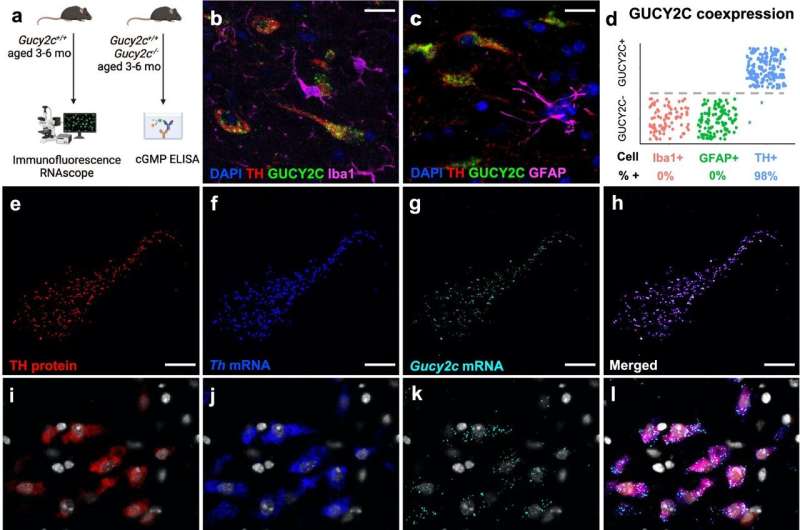This article has been reviewed according to Science X's editorial process and policies. Editors have highlighted the following attributes while ensuring the content's credibility:
fact-checked
peer-reviewed publication
trusted source
proofread
Gut protein may protect brain cells in Parkinson's disease

Nearly 10 million people worldwide suffer from Parkinson's disease (PD), a condition causing muscle rigidity and tremors due to the loss of the chemical dopamine in the brain. One cause of PD is exposure to toxins. In a recent study, Thomas Jefferson University's Scott A. Waldman, MD, Ph.D., and his team discovered that a gut receptor protein called GUCY2C could prevent PD development by protecting against brain damage and toxic insult.
The work is published in the journal npj Parkinson's Disease.
Dr. Waldman's team has been studying GUCY2C for years. It's generally known for its role in water and salt secretion in the gut. However, GUCY2C is also produced in the brain. Previously, the team removed GUCY2C from gut cells in mice and saw an increase in the expression of genes associated with PD.
"That's when we made that leap from the gut to the brain," says Dr. Waldman. "If we removed GUCY2C in the brain, would it impact susceptibility to PD?"
Lara Cheslow, an MD-Ph.D. student in the Waldman lab, worked with Richard Smeyne, Ph.D., chair of the neuroscience department and director of the Jefferson Comprehensive Parkinson's Disease and Movement Disorder Center, to investigate this question. They found that mice in which GUCY2C expression was "knocked out" or removed had more brain-cell damage and were more susceptible to toxins, compared to mice with normal GUCY2C.
Moreover, when mice with normal GUCY2C levels were exposed to a toxin, GUCY2C levels naturally increased. This suggests that it was almost as if GUCY2C played a protective role in mouse brain cells or neurons, which surprised researchers given its normal role in the gut.
This led the team to look at human samples to see if GUCY2C expression showed the same trends. Samples from PD patients showed elevated GUCY2C levels compared to samples from patients who did not have PD—a result that puzzled researchers.
Current therapies for PD mimic dopamine, which simply manages PD symptoms. Targeting GUCY2C could be a more promising avenue to potentially prevent disease progression altogether by protecting against neuron damage. Although these studies are in the early pre-clinical stages, Dr. Waldman hopes that they can one day benefit patients suffering from PD.
More information: Lara Cheslow et al, GUCY2C signaling limits dopaminergic neuron vulnerability to toxic insults, npj Parkinson's Disease (2024). DOI: 10.1038/s41531-024-00697-z



















